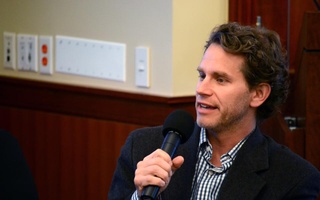While he says he got up to speed on what was happening globally “pretty quickly,” making the adjustment from covering local court cases or duck pond preservation projects to covering political upheaval in Zimbabwe was no small feat.
Working out of Westminster, Lister’s World Service phase was also the one in which he met his future wife. The couple has managed to coordinate several career relocations so that they’re always based out of the same city—a plus for their eight-year-old son.
Lister’s coverage shifted across the Atlantic when he became a United States affairs analyst working on stories that the BBC heard about before people in the U.S. were even awake.
“I had one of the first internet connections in the BBC,” he remembers of this period in the mid-1990s. “I don’t think people really knew whether or not the internet would be important enough for everyone to have it.”
He next made his television debut, working for BBC World TV, which Lister says initially was “sort of a terrifying experience.”
“Suddenly you’re working with an editor and a producer and they both have different ideas about what each piece should be like,” he says. “It was a good lesson about working with colleagues.”
But it was only a matter of time before Lister relocated from the West London television center to a new perch up-close-and-personal with American politics: Washington, DC.
A VERY BUSY TIME
Lister says international travel was one of the allures of broadcast journalism, but it wasn’t until he became the BBC’s U.S. State Department correspondent that his passport started to really get a workout.
“I went to at least 40 countries with [Secretary of State] Madeleine Albright,” he says. “At least half of them more than twice. It was a very, very busy time.”
Lister was one of eight to ten journalists who routinely shipped out with Albright. He says that despite competing to assemble the best broadcast, those exhausted journalists shared quite a bond.
“When many people on the plane would be sleeping, we’d have to be writing or filing stories,” he says. “In 24-hour news, everybody expects you to be able to file all the time.”
Radio—and occasionally TV—broadcasts could be a struggle in some foreign locations, he remembers, juggling language barriers, technical difficulties and transportation obstacles. But reporting from North Korea, Mongolia, China, India, Pakistan—“everywhere, really”—had rewarding elements as well.
“It gets the adrenaline running,” he says. “The buzz is knowing that you’ve been able to produce a story under very demanding circumstances, and do it in a way that people find interesting, or informed, or intelligent.”
Environmental issues were not an intentional focus of Lister’s—but after covering mudslides in Venezuela and earthquakes in Turkey, he started to develop an interest in natural disasters and questions of sustainability.
Read more in News
Lab Rat Of The Week: Sydney “Alison” KraemerRecommended Articles
-
Nieman Fellow Wins International AwardHollman Morris Rincon, a Colombian journalist and Nieman Fellow who was initially denied a visa this summer to study in the United States, was recently awarded the 2011 Nuremberg International Human Rights Award for his coverage of human rights violations in Colombia.
-
Somali Journalist Recognized for Brave CoverageMohamed Olad Hassan, a Somali journalist who has covered the people of his nation amid dangerous insurgency over the last ...
-
(Not) Eating at HarvardWhile Harvard offers a number of resources for students with eating disorders, eating disorders are often stigmatized and can slip under the radar.
-
Twenty Four Nieman Fellows AnnouncedTwenty-four journalists who work in media ranging from newspapers and magazines to radio and television have been chosen for the 2011-2012 class of Nieman Fellows, the Nieman Foundation for Journalism at Harvard announced on Tuesday.
-
 An Interview with Nieman Fellow Jen B. McDonald
An Interview with Nieman Fellow Jen B. McDonald -
 Journalists Discuss Impact of Social Media on Recent Coverage
Journalists Discuss Impact of Social Media on Recent Coverage













